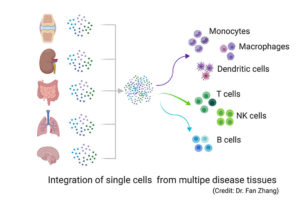Rheumatologists Worldwide Pulling Together in Face of Coronavirus Pandemic
Rheumatologists have a critical role to play in optimizing the response to COVID-19 and outcomes for our patients with rheumatic diseases. In just the past few weeks, rheumatologists at Brigham and Women’s Hospital and around the world have joined forces for this purpose.
“I’ve been very impressed by how quickly the rheumatology community has come together,” said rheumatologist Susan Y. Ritter, MD, PhD, associate medical director of the Brigham’s Arthritis Center. “I’ve seen multiple people communicating via email, Twitter and Facebook to get the word out to rheumatologists and make sure we have as much data as possible.” Read More

 This November, members of Brigham and Women’s Hospital’s Division of Rheumatology, Inflammation and Immunity presented several groundbreaking studies at the American College of Rheumatology’s (ACR’s) annual meeting in Atlanta.
This November, members of Brigham and Women’s Hospital’s Division of Rheumatology, Inflammation and Immunity presented several groundbreaking studies at the American College of Rheumatology’s (ACR’s) annual meeting in Atlanta. Traditionally, juvenile idiopathic arthritis (JIA) has been considered a distinct condition from the types of arthritis seen in adults. But increasingly, research is showing that juvenile and adult forms of arthritis represent a continuum.
Traditionally, juvenile idiopathic arthritis (JIA) has been considered a distinct condition from the types of arthritis seen in adults. But increasingly, research is showing that juvenile and adult forms of arthritis represent a continuum.

